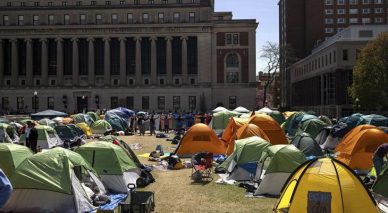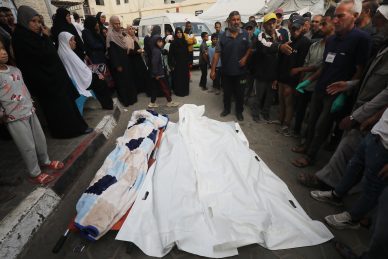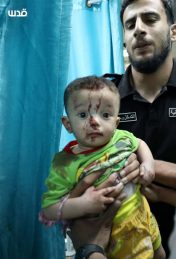GAZA, (PIC)
Citizen Abu Mohammed Islaim (50 years old) is forced to move every two days to areas where he can pick up communication signals to talk to his sons in Rafah, located in the southern part of the Gaza Strip. He had to stay in Gaza City and not evacuate at the beginning of the ground invasion at the end of October last year.
Abu Mohammed tells the Palestinian Information Center (PIC): “I stayed in Gaza City due to special circumstances and couldn’t leave to the south. My sons evacuated with their families, and since then, the suffering began. There are no comfortable communications, and we receive no immediate news.”
He adds that with every airstrike, fear and anxiety creep into their hearts. He and his sons worry about each other, especially with the Israeli army threatening to invade Rafah where his sons are located. His fears for his sons and their families increase.
Oppression and pain
As for citizen Salman Hassan (70 years old), he fled with the start of the invasion to Mawasi area to the west of Khan Yunis City. His son Mahmoud fled to Deir al-Balah City with his family, while his eldest son Ibrahim fled to Rafah.
He tells the PIC, “What happened to my family is truly dispersion. The family has been scattered for five months now, and we hardly meet once a month or every two months, amid intense fear and anticipation.”
These are tales of oppression and pain woven by the events of the Israeli genocidal war. Families are separated and torn apart by death, detention, and displacement. It’s a harsh war unlike any recorded in modern history.
It is worth mentioning that the occupation army has established a military road separating Gaza City and its north from the central and southern parts. The soldiers kill any Palestinian attempting to head north, resembling a racist military apartheid system.
Islaim dreams as he continues talking to the PIC that the genocidal war ends, the separating road disappears, families reunite, and security and freedom prevail in Palestine and Gaza.
Intense feelings
Social researcher Mahmoud Hayyan says, “The nature of families in Gaza society is cohesive and extended, linking families with good social relationships. Based on this interaction, it’s certain that some family members have fled south while others remained in the north.”
Hayyan adds, “During war, emotions become intense, especially since this fighting differs from any previous military operation. Hence, we record escalating anxiety and tension among the displaced, who express concern for their relatives who refused displacement.”
The researcher continues, “After repeated waves of displacement for more than five times, we can affirm that Gaza families have become scattered, even in the south itself. There’s no longer any connection or communication between them; it’s become every family for itself. Each husband takes his family and flees with them, and there are few cases where families are separated from each other.”
The expatriates
Expatriates live in a crushing humanitarian situation. Tens of thousands of Gazans live outside Palestine. Samar, who was married in Germany, says she needs long days to communicate with her family in Gaza City, only to discover they’ve fled south under the war and shelling.
She adds, “In every call we attempt with our families, we face significant difficulties due to the electricity shortage in Gaza and the deterioration of internet and communication services.”
She confirms that feelings of fear and anticipation dominate her, saying she follows the news through channels and agencies around the clock, praying to Almighty Allah to dispel the distress and bring peace to the troubled region.
Communications are the only refuge for obtaining information, but communication networks and towers have suffered severe damage due to Israeli airstrikes.
Minister of Communications and Information Technology, Issac Seder, says, “Gazans have lost communication with each other more than nine times; there are 66 areas with no coverage at all.”
Seder adds, “77% of the towers covering Palestinian networks have suffered damages that are difficult to repair. The interruption or malfunction of communications means the interruption of the internet, which is now only used by a few.”
Since October 7th last year, the Israeli forces have waged a devastating war on the Gaza Strip, resulting in tens of thousands of martyrs, wounded, and missing, alongside the displacement of millions and extensive destruction of homes and infrastructure, affecting more than 70% of the buildings, amidst a strict siege, a suffocating humanitarian crisis, and an unprecedented famine, especially in Gaza City and its northern areas.















